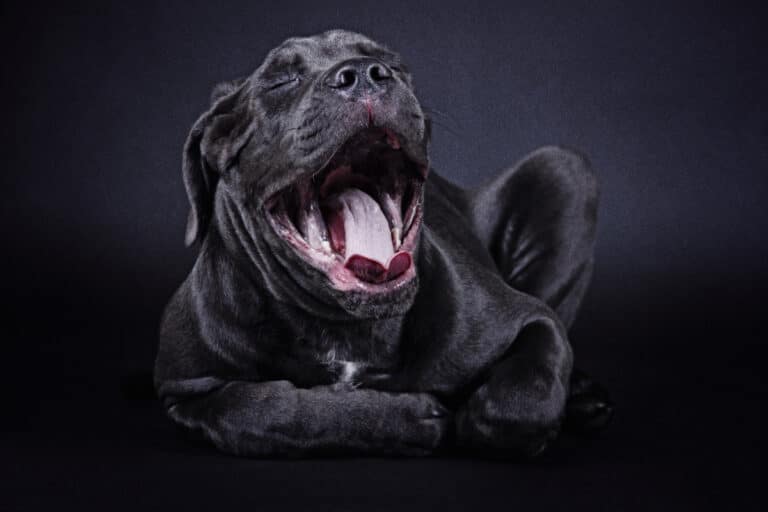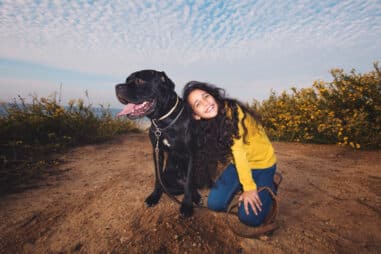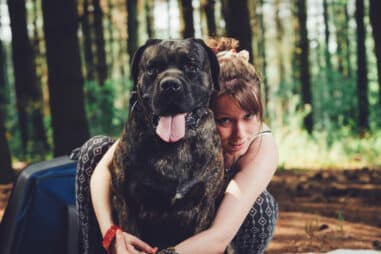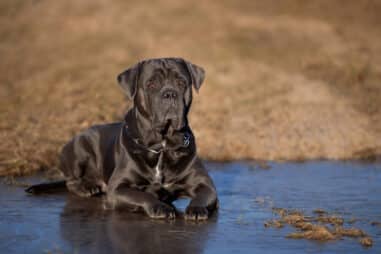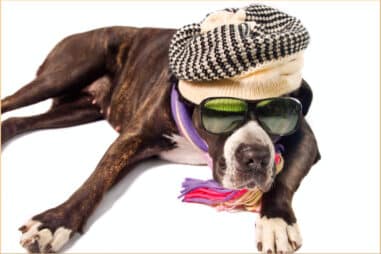Your Cane Corso won’t bark as much as the next dog does. Unless someone or something is pushing him to do so. He can get a little vocal though barking is not his usual choice.
He may not be able to speak like humans. But that furry friend of yours won’t shy away from communicating through vocal sounds. If he’s more prone to incessant barking, there’s an issue behind it.
Barking is a result of excitement, boredom, attention seeking, or anxiety. It’s also a reaction to disturbances like loud noises. Proper training techniques will keep your Cane Corso calm and lessen his barks.
Familiarize him with the “quiet” command and go for a calm approach. Don’t encourage or reward his barking but don’t resort to punishment either. You can avoid or at least minimize the triggers by using positive reinforcement instead.
Are Cane Corsos Vocal?
Cane Corsos are generally calm and quiet dogs. But according to some owners, they are also vocal in a way. They put their vocal cords to good use in communicating.
Cane Corsos use grunts and other sounds to express themselves. As if they’re trying to get a few words out of their mouths. When it comes to barking, they’re not frequent barkers.
There are some exceptions though. Due to their protective nature, barking can still occur. The presence of unfamiliar people and animals will push their protective buttons.
You can expect them to be quiet most of the time. Unless they have something to get across like asking for something. He’s possibly telling you that there’s something unfamiliar or suspicious around you.
The sounds they make could mean different things. They’re not the noisiest dogs around. But they can still make use of their mouths and vocal cords from time to time.
Pay attention to what they’re trying to communicate without spoiling them. With the help of a trainer, you’ll understand their language better. Some noises are also symptoms of an existing health issue.
Why Are Cane Corsos So Vocal?
Cane Corsos are not the most vocal dogs out there. But they are still capable of expressing different emotions through sounds. There are many reasons behind the sounds that Cane Corsos make.
It depends on the situation they’re in. If they’re playing, vocal sounds are expressions of enthusiasm and enjoyment. But you should monitor the tone.
The light and playful sounds are only natural when they’re having fun. When there’s some intensity to growling and barks, it’s a possible sign of aggression. In other situations, the sounds are caused by boredom, pain, fear, and attention seeking.
Cane Corsos can also use sounds when asking for food among other things. Don’t always give in to this vocal stuff. This will only spoil a dog and lead to bad behavior.
Remember that you are the leader of the pack and establish boundaries. Respond to his barks, yelps, or growls when necessary without using punishment methods. Teach and remind him of the quiet command.
There are plenty of reasons for a Cane Corso to get vocal. Aggression, boredom, excitement, fear, and pain are only a few of them. A trainer or vet can help you decipher what every sound means.
Do All Cane Corsos Bark?
Like any other dog, Cane Corsos are capable of barking. Maybe not as much as the other breeds do. But they’ll bark when they deem that there’s a threat prowling around.
Cane Corsos are not the ones who cross the lines of nuisance barking. One’s behavior is still dependent on different factors though. Your habits and environment can have a big impact on your doggo’s behavior.
If you cultivate your Cane Corso’s protective nature, his barking frequency might increase. But with other activities and socialization, his barking won’t pester you as much. Because idleness and isolation are not enticing to this breed.
Barking is a natural part of a dog’s language. Your Cane Corso is not so different so don’t let his barks get out of hand. Do this by redirecting his energy to a less noisy and less distracting activity.
He is not a notorious barker but capable of being one. Don’t encourage those loud barks and keep him happy without spoiling him. A calm and firm approach will establish the concept that you’re not messing around.
Why Does My Cane Corso Bark So Much?
Excessive barking goes against Cane Corso’s natural behavior. He’s protective but won’t bark constantly for no good reason. Without prior training or checkup, this issue could get worse.
The possible reasons for his barking are aggression, boredom, and pain among others. The condition is sometimes due to physiological reasons. At other times, his barks are caused by something psychological.
Consult your vet when your Cane Corso is on a barking rampage. This behavior indicates that there’s an issue worth addressing. Whether it’s caused by physiological or psychological reasons, you can’t take it for granted.
Your Cane Corso may need medications, therapy, and some help from a trainer. You also have an important role to play because negligence can lead to barking. Give him attention and affection by exercising and cuddling but not too much.
Whatever maladies or behavioral issues he’s having, show support and patience. An emotional owner could only amplify the levels of anger, boredom, or fear. Display authority without intimidation to avoid compromising your relationship.
If your Cane Corso is not particularly aggressive and not in pain, he’s probably just bored. He’s probably trying to put his protective side on display. Keep everything balanced by involving him in healthy and stimulating routines.
At What Age Do Cane Corsos Start Barking?
Your Cane Corso will put his vocal cords to test at about 7 to 8 weeks. He’ll start with simple grunts and yelps until he gets comfortable. Barking will follow once he gets the hang of it.
A dog can do full-fledged barking at 16 weeks of age. Cane Corsos are not constant barkers unless they’ve been trained to be. Don’t encourage this because you’re going to have problems in the future.
A Cane Corso puppy won’t take long to learn about barking. When barking becomes excessive, address it right away by getting him checked or trained. This is to stop bad habits and behaviors from getting worse.
Avoid rewarding his loudness and reward him for being quiet instead. Keep it under control by involving him in fun, stimulating, and social activities. They help take his attention away from those loud barks.
There are plenty of things that can push a dog to bark as it’s a part of their language. When he reaches adulthood, those barks would eventually decrease. That is if he’s having an active and healthy lifestyle.
Do Cane Corsos Grow Out Of Barking?
Your Cane Corso’s barking frequency would decrease with age. But he won’t grow out of it completely because barking is a part of a dog’s language. Unless you put him through the cruel and unjustified method of debarking.
You can teach him to stay quiet instead when barking is unnecessary. He’ll put those barks to good use when he wants to protect you or ask for something. The thing is he might get overprotective so give him enough exposure to social settings.
Doing that will accustom him to other people or animals and their movements. It’s natural for a Cane Corso to get a little territorial. That’s how they show love and loyalty but isolation and boredom may lead to nuisance barking.
Find the perfect balance between freedom and control. If you’re too controlling, it’ll make him prone to aggression. On the other hand, he can also display bad behavior if you give him too much freedom.
Exercise and socialization are vital in developing good habits. Teaching him the quiet command is going to be useful when you need some silence. Your Cane Corso will not completely grow out of barking but training can keep it under control.
Can Cane Corsos Be Trained Not to Bark?
You can train your Cane Corso to stop barking. Of course, he won’t completely drop it as if it doesn’t exist. Training will make him more good-natured and reasonable.
The quiet command is the most commonly used method for barking. It’s a verbal cue that he’ll remember through repeated attempts. You can add a hand signal to aid the command better.
Don’t point your finger, though, as dogs usually see this as an invitation to aggression. Use your palm instead in a relaxed and gentle pose. When he’s barking, say the word quiet and use that palm gesture.
Do this repeatedly and reward him with a treat once he stops barking. Don’t make the mistake of rewarding him while he’s barking. This will only encourage him to bark more.
Make him pay attention to what you say and do. When he responds by stopping his barks, that’s the time for a reward. This can be frustrating for some, but it’ll take patience and repeated attempts to succeed.
You can train your Cane Corso not to bark. He’d still bark in other situations but training provides a way for better communication. He’s not from a loud dog breed so you don’t have to worry that much.
Do Cane Corsos Bark at Other Dogs?
With enough social experience, your Cane Corso won’t bark at other dogs. But he can still bark from time to time. You have to remember that despite not being an infamous barker, he’s still protective.
If another dog is trying to get aggressive and dominant, he’ll bark as a reaction. Your Cane Corso won’t back down from a challenge of a canine showdown. Barking is not always a sign of dominance.
A Cane Corso who’s suffering from anxiety will bark out of fear. His large size and protective trait won’t exempt him from getting scared for dear life. Even the bravest dogs cower in fear when they’re unwell.
Cane Corsos share similar traits but they can still have different personalities. Some are more dominant than others and fights are common among males. If your Cane Corso has the habit of barking at other dogs, give him more social experience.
While you’re at it, put him on a leash and stay at a safe distance from other dogs. A neutral setting or place helps prevent a fight from breaking out. Discuss the barking issue with a professional if he’s not responding to your commands.
Your Cane Corso will bark at another dog as a sign of loyalty and protection. On the other side of the coin, barking is a symptom of fear or sickness. He might find the presence of another dog intimidating.
Why Does My Cane Corso Bark at Big Dogs?
Your Cane Corso would bark at other big dogs for three reasons. Aggression, excitement, or fear. The second one is what every owner would want because no one gets hurt in it.
He is a big dog himself but there are other large dog breeds too. Barking on another big dog depends on the situation or place. If a massive doggo wanders around your property, he’ll bark at the trespasser.
If he meets a fellow big dog in a public place, he might just ignore its presence. It depends on your Cane Corso’s mood and personality. Some are more combative while others are friendlier.
If he’s the former, you’d need to stay the hell away from the other dogs. Focus on taming the beast first before bringing him out in public. You won’t have much of a problem when he’s already a friendly one.
The mood and personality of the other dog in question also come into play. There are three possible scenarios for barking. The worst is he could bark to challenge the other dog to a fight and vice versa.
Another possible scenario is he’d bark and whine out of fear. It could be the other way around where your Cane Corso is on the dominant side. The best one to experience is barking out of excitement.
The safest encounter is when big dogs are friendly with one another. The personalities and experiences of the dogs involved would determine the result of a meeting. Well-trained dogs won’t cause a headache so give training a shot.
How to Stop Cane Corsos From Barking at Other Dogs?
To stop a Cane Corso from barking at other dogs, you must focus on socialization. Familiarize him with the quiet command as well. Barking is a common response to territoriality, overexcitement, and at times anxiety.
At home, make him learn the quiet command. Say the word “quiet” over and over when he’s barking. Look at his expression and when he stops give him a simple treat.
Do it carefully or you might get the opposite result of this training. Getting a treat while he’s in the middle of barking gives him the wrong idea. Only reward him when he responds correctly to your verbal cues or hand signals.
After repeated attempts, it’ll sink in that his barking doesn’t entitle him to a treat. His silence does. Once you’re done with that step, gradually introduce him to the outside world.
If he’s still a little rowdy, additional help from a pro trainer is also a good step. A trainer will provide activities or classes where your Cane Corso can socialize. He can make new friends along the way and learn to control his tendency to bark.
Quiet command and socialization are effective ways in stopping a dog from barking. Make sure that he’s got a clean bill of health by taking him to your vet for checkups. Barking is a warning sign of a brewing health problem and you should watch out.
Do Cane Corsos Bark at Strangers?
An unsocialized Cane Corso is suspicious and will bark at strangers. He might even bark at the ones with good intentions. Your Cane Corso’s barks would work in your favor when it comes to shady strangers.
Barking becomes a problem when friends or neighbors walk by your front yard. This distrust of anyone familiar is rooted in a lack of socialization. Your Cane Corso is born to move and mingle.
Isolating him can backfire and stress you out in the future. Make time for short walks outside. Exercise helps a lot in spending the excess energy in his tank.
Lack of activity and interaction can drive even a good-mannered dog crazy. Though Cane Corsos are big, they’re not fans of isolation and idling. The well-trained and socialized ones will bark less than those who aren’t.
Barking is not this breed’s favorite thing to do. If you can’t provide the interactions they need they’d bark and be grumpy to strangers. See to it that they’re getting a healthy dose of stimulation to prevent this loud habit.
How to Stop Cane Corsos From Barking at Strangers
You can stop your Cane Corso from barking at strangers with the quiet command. Frequent exposure to social settings can diffuse his suspiciousness. He’d bark at strangers for protective reasons.
Quiet command and getting used to people and animals usually work on excessive barking. Exercise and other stimulating activities will refrain him from that bad habit. Barking is useful in crucial situations but a nuisance in mundane ones.
Your Cane Corso will bark if he’s sensing some kind of threat around. Without training him, he’d bark as a reaction to everything. A pro trainer can give you additional tips on how to handle a vocal Cane Corso.
Talk to your vet if the socializing, quiet command, and other techniques didn’t cut it. Some concerns that require medical intervention are manifested through barking. Pain or discomfort from injuries and diseases can push a dog to bark, whine, or yelp.
Why Do Cane Corsos Bark at Kids?
A Cane Corso is going to bark at children to show dominance. Bear in mind that Cane Corsos are big dogs and human kids are small. The difference in size can make such a dog behave dominantly.
Even though they’re friendly and sociable, they’re no pushovers. For an owner with no prior experience, this dog is a little difficult to deal with. It’s one of the reasons why pairing your Cane Corso and a kid is problematic in a way.
Your Cane Corso can get along with a kid in your family. However, he can still bark at the kid to show dominance even in light and playful settings. He might respond to the quiet command but he could still do it when you’re not looking.
Don’t leave a Cane Corso around little kids without your supervision. Look out for dominant behavior and intervene if necessary. Due to his size, he can still hurt the kids around him without the intention to do so.
Why Does My Cane Corsos Bark at Night?
Your Cane Corso is barking at night for several reasons. The most common one is he’s doing it as a reaction to his surroundings. Movements and noises will catch his attention and he’ll respond through barking.
Barking helps in securing a home as it gets your attention when something’s up. On other occasions though, his barks may start to annoy you. The habit is a liability if he’s barking at everything that moves or creates a sound.
Boredom, hunger/thirst, and a need for a bathroom break are also barking triggers. If he’s not feeling very well, he’d bark to express his discomfort. Those different reasons need different courses of action.
If he’s suffering from boredom, an uneventful day could trigger his barks. Spending the excess energy on exercise will distract him from barking. Make sure that he’s properly fed and well-hydrated so hunger or thirst won’t bug him at night.
He might bark when he needs a bathroom break. Provide an accessible area where he can relieve himself so he won’t badger you at night. He can use a litter box if going outdoors is a little inconvenient or near impossible.
Lastly, barking is possibly caused by an ailment. Consult your vet if you suspect that your Cane Corso is barking due to sickness. If a dog is unwell, barking is sometimes accompanied by whining, yelping, or howling.
Do Cane Corsos Howl?
Your Cane Corso may howl if he’s under the weather or injured. He’s not from a noisy breed but some problems can make him louder than usual. Make sure that his health is in good condition.
If he’s constantly howling, there’s a problem that requires medical attention. Boredom can also play its part in his howling. Keep him busy with healthier activities like exercise during the day to prevent boredom and howls.
In less serious cases, he’d howl to communicate and announce his presence to fellow dogs. Howling is also a reaction to high-pitched sounds that he’s hearing. He might mistake a siren for a howl from another animal so he’d respond by howling too.
Cane Corsos are not infamous howlers but they do have the capability. Try to find out the reasons behind his howling by getting him checked. The sounds that he’s making are not meaningless after all.
Why Does My Cane Corso Howl at Night?
There’s a superstitious belief that howling is ominous. In some cultures, people believe that a dog’s howl is connected to death. However, howling is caused by different things and it’s not always death related.
Your Cane Corso will howl to communicate and announce his presence or deal with boredom. Hunger, thirst, pain, and the need for a bathroom break are also expressed through howling. To prevent the nighttime howling, you must do something about the causes.
The remedy for boredom is stimulation. Exercising during the day will stimulate him enough and minimize howling at night. Feed him on schedule so he won’t howl due to a grumbling tummy.
He’s possibly worried about staining your carpet with pee or poo. For potty breaks, provide an accessible spot where he can relieve himself. He can use a litter box or give him a way to go outside without compromising security.
Cane Corsos are mildly expressive but they’re not always loud. Aside from boredom, hunger, or potty break, pain is a possible reason too. If you suspect that his howling is caused by pain, don’t delay an appointment with your vet.
Howling on repeat is not completely harmless or meaningless. Your Cane Corso is trying to get something across. With the help of a professional, you can trace the causes and respond accordingly.
Are Cane Corsos Yappy?
Cane Corsos are not the yappy and loud types. They’re vocal from time to time but they won’t throw a tantrum through yapping. The presence of triggers can turn him into a yappy dog though. Boredom and pain are common causes of barking or yapping.
Your Cane Corso will also do it when he’s reacting to the sights and sounds around him. Seek professional help if he’s constantly noisy. There’s a more serious problem when your commands don’t receive a positive response. Constant yapping is not a behavior you can ignore. Without the presence of an issue, Cane Corsos are fairly quiet and not yappy.
Why Is My Cane Corso So Yappy?
The bothersome sounds of yapping are caused by equally bothersome problems. Yapping is pretty much the same as constant barking. The common causes are sickness and boredom. Boredom is addressed with movement and other stimulating activities.
Cane Corsos are not extremely active dogs but don’t like the idleness either. A moderate exercise will help in boredom-related yaps. Another reason for a Cane Corso to get yappy is the discomfort he’s feeling. It could be due to a disease or injury but it’s uncomfortable nonetheless. Meet with your vet regularly to get any kind of health issue treated.
In other cases, your dog will just yap at anything that moves or creates a sound. Frequent activities, socialization, and white noise can distract him from his yappy noises. You can correct this by teaching him the quiet command with words and hand signals.
Why Does My Cane Corso Whine?
Your Cane Corso is going to whine when he’s anxious, excited, feeling sorry, or seeking attention. Compared to loud and sometimes dominant barks, whining is more subdued and less powerful. When done continuously, it’s annoying and will make you want to pull your hair out.
Anxiety, confusion, and fear could push the buttons of a Cane Corso. These are triggered by your absence, loud sounds, or the presence of a more intimidating animal. The excitement to see you or a friend will make him whine as well.
If he’s guilty of staining the floor or destroying your things, whining is an expression of regret. Boredom and attention-seeking are also reasons for a dog to whine. Don’t encourage or reward attention-seeking as he’ll only do it more and more.
When whining becomes unstoppable no matter what you do, ask for medical assistance or treatment. Whining is a very common warning sign if a dog is hurting badly. The causes for whining are not so different from the causes of barking or yapping.
How to Stop Cane Corso Whining
You can make use of the same method for making your Cane Corso stop barking. That is the quiet command where you can apply verbal cues or a few hand signals. Your course of action depends on what causes the whining.
For attention-seeking behavior, you can try the quiet command as well. If he responds well to the quiet command, you can give him a treat as a reward. But sometimes it’s better to ignore him and use negative body language instead.
The alternative is ignoring his whines by crossing your arms and turning away. The said actions indicate that such behavior is not tolerated. If his attempts to get attention go unrewarded, he’d be discouraged to whine.
If your Cane Corso is whining due to anxiety and sickness, you’ll need a different approach. He needs medical attention if health issues are behind the whining. Boredom is another trigger for whining and exercising during the day helps in preventing it.
Why Does My Cane Corso Puppy Cry So Much?
Puppies are still in a phase of discovering the world and crying is a form of expression. Just like other puppies, a young Cane Corso will cry for different reasons. Adults don’t cry as much but they can make use of their voices to say something.
Your Cane Corso will do it, too, by crying and the common causes are hunger/thirst and boredom. At a young age, puppies already need mental and physical stimulation. Preventing them to get such stimulations could lead to boredom.
When boredom hits, crying comes next so make sure that your pup’s getting enough activity. A rumbling stomach due to hunger will motivate a pup to cry. It’s not healthy to separate a young one from its mother because the mother’s milk is essential.
During the first few weeks or months, a Cane Corso mom will take care of her pups. In a puppy’s weaning period or phase, it’ll start to explore more without the mom’s help. That’s when you can take charge of meals since weaning puppies can’t rely on just milk alone.
See to it that your pup is properly fed to prevent the noise created by constant crying. In a more serious case, a puppy will cry if there’s some pain involved. The onset of a health issue must be addressed immediately.
Puppies are still too fragile to cope with sickness so a quick response is needed. Boredom, hunger, and sometimes fear are common causes of a puppy’s crying. Sickness is also possibly present when other reasons have been crossed out. Seek help from professionals when the cries get a little too much.
How Can I Make My Cane Corso Quieter?
Your Cane Corso is still prone to noisy behavior despite coming from a relatively quiet breed. There are multiple causes for one to become relentlessly noisy. Your response to the noises will differ depending on what causes them.
For aggression, anxiety, and boredom, you need to take him out for walks during the daytime. It’s a perfect way to get some fresh air and move around and socialize. Make it slower or gentler if he’s an anxious one who reacts by making a noise.
The quiet command is commonly used to keep the noises at bay. Don’t reward the barks, whines etcetera, but reward his silent response to the specific command. A treat sends a message or gives him the idea that listening and responding with silence warrants a reward.
You have to apply the technique carefully because you might get the opposite effect. Misinterpreting the command will push him to make more noises. In the case of attention-seeking behavior, the quiet command may not work.
Ignoring his attempts to get attention with unreasonable noise is a better route. When the noises are caused by a myriad of health issues, he needs medical help. A trainer or a vet can lend a helping hand in treating and correcting noise issues.

